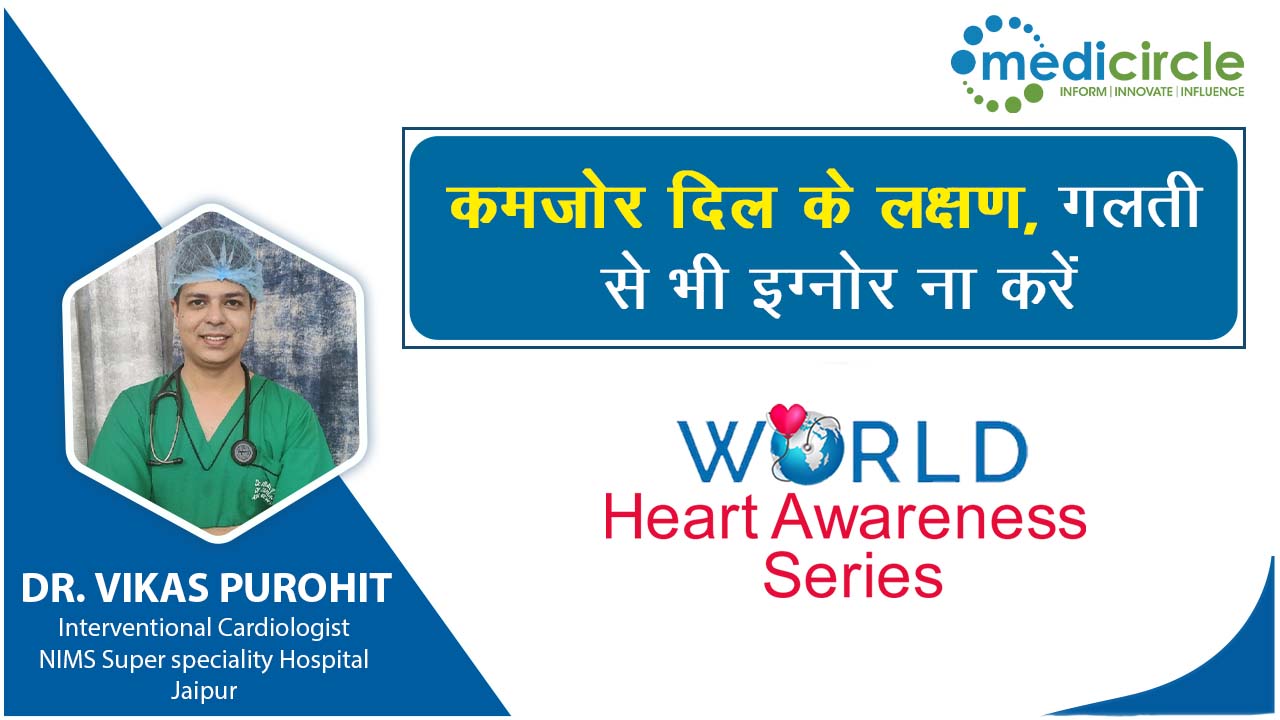Dr. Vikas Purohit is an Interventional Cardiologist in Jaipur and currently practicing in NIMS Super Specialty Hospital, Jaipur. For the past 7 years, he has worked as a Cardiologist.
Heart disease - Signs
Dr. Vikas begins, “The heart is a muscular organ that pumps the whole life. There are two kinds of heart problems – the pumping mechanism gets weak (also termed heart failure). The heart is still working but not as well as it should be. This disables the blood to reach other body parts. Presentation of heart failure is
- Fatigue
- Shortness of breath (gets worse when lying down)
- Swollen ankles
- Heart palpitation
- Loss of consciousness
These all are the symptoms of a weak heart and signify heart-related issues.”
Blood test for heart disease
There are several risk factors that result in developing heart problems later in life. These risk factors are
- Diabetes mellitus
- Hypertension
- Dyslipidemia (Total cholesterol and LDL are high)
- Smoking
Blood tests for diabetes, hypertension, and dyslipidemia are the general blood tests for heart diseases.
Biomarkers such as DMP and terminal DMP detect the normal functioning of the heart’s pumping. Troponin and Creatinine Phosphokinase (CK) are heart enzymes (biomarker tests) that detect cardiac health. They are performed in accordance with the risk factors and symptoms. These markers not only help in diagnosis but prognosis of the disease too.
A routine checkup also helps in diagnosing the disease timely.
High blood pressure and heart disease
Dr. Vikas says, “High blood pressure is a risk factor or precursor for advanced heart problems like heart attack and epilepsy. 20-30% of patients are aware of their high BP. Of these, 2/3rd are unable to manage or control their high BP. 70% are having high BP but are not aware of it. Effective management of hypertension therapy can prevent severe complications and deaths in the future.”
Diagnosing heart disease
Dr. Vikas describes, “Several tests are there for the diagnosis of heart problems.
If diabetes, hypertension, and lipid test profiles come positive, then the doctor suggests other advanced tests for the heart.
- ECG – Detects pumping mechanism, manufacturing defects like congenital heart disease
- Treadmill test – This is performed by putting extra stress on the heart
- Stress echocardiography test – These are an advanced test for heart disease (these tests detect any blockage of the blood vessel)
- Coronary angiography
Smoking is the leading cause of heart problems in young generations.”
Dr. Vikas adds, “If you are having no symptoms (living a healthy lifestyle, diabetes, and hypertension is well controlled), then you don’t have to panic. Patients having symptoms are generally advised to go for the advanced test while high-risk groups are prescribed these tests on a routine basis. Certain professions like the loco pilot of trains and pilots of air flight require these tests on a routine basis. Moreover, advanced heart tests are recommended only on the basis of symptoms and signs of the patient.”
Dr. Vikas emphasizes, “If you have just started going to the gym, don’t start with high-weight training or exercise, go slow. Initially start with low-intensity workouts and gradually increase our pace. This will prevent heart attack and the possibility of muscle wear and tear.”
Rapid fire
1. Is chest pain the only warning sign of heart disease?
No. but it is the most prominent sign. And there are silent heart attacks also.
2. Is rice good for heart health?
There is no strong evidence.
3. Should people avoid exercise ifthey have heart disease?
Not exactly. Initially go slow and then increase your temper. Physical activity 30 minutes a day, 5 days a week is recommended.
(Edited by Renu Gupta)

 Once considered a disease of older patients, heart diseases are now prominent in young generations too. Now 1 in 5 heart attack patients is younger than 40 years of age. Smoking is the leading cause of heart problems in young generations. Let’s get more detail on this from expert Dr. Vikas Purohit, Interventional Cardiologist.
Once considered a disease of older patients, heart diseases are now prominent in young generations too. Now 1 in 5 heart attack patients is younger than 40 years of age. Smoking is the leading cause of heart problems in young generations. Let’s get more detail on this from expert Dr. Vikas Purohit, Interventional Cardiologist.







.jpeg)


.jpg)









.jpeg)





.jpg)




.png)



